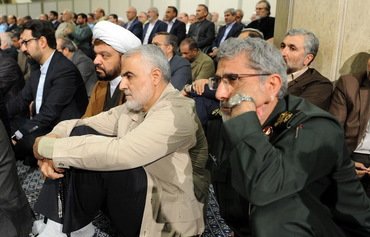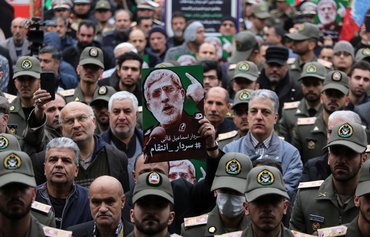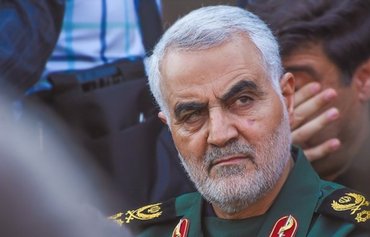Esmail Qaani, the new commander of the Islamic Revolutionary Guard Corps Quds Force (IRGC-QF), was not known enough even among Iranians themselves.
Unlike Qassem Soleimani, the force's former commander who was killed in a US raid last Friday (January 3rd) in Baghdad, Qaani's media appearances have been scarce and he is said to be less charismatic than his predecessor.
However, Qaani is expected to provide a continuity, rather than a change, in the Quds Force's expansionist plans in the region.
Qaani, formerly Quds Force deputy commander, was named by supreme leader Ayatollah Ali Khamenei in the immediate aftermath of Soleimani's killing.
![New IRGC Quds Force commander Esmail Qaani. [Photo circulated on social media]](/cnmi_di/images/2020/01/09/21886-iran-esmail-qaani-600_384.jpg)
New IRGC Quds Force commander Esmail Qaani. [Photo circulated on social media]
![New IRGC Quds Force commander Esmail Qaani (2nd from right) during the Iran-Iraq war with Iran's Supreme Leader, Ali Khamenei (3rd from right). [Photo circulated on social media]](/cnmi_di/images/2020/01/09/21887-iran-qaani-war-600_384.jpg)
New IRGC Quds Force commander Esmail Qaani (2nd from right) during the Iran-Iraq war with Iran's Supreme Leader, Ali Khamenei (3rd from right). [Photo circulated on social media]
Appointing Qaani, Khamenei said the "orders remain exactly the same" for the Quds Force, which is charged notably with the IRGC's external operations -- making the force a key player in Iraq, Lebanon, Syria and Yemen.
Born in the Iranian city of Mashhad, Qaani who is in his sixties, has been known since early youth for his devotion to and defence of the Iranian revolution that overthrew the Shah's regime in 1979.
Since the start of the Iraq-Iran war in 1980, he has been entrusted with many military tasks, beginning with commanding the IRGC's Imam Reza 21st Division and then the al-Nasr 5th Division.
The Iraq-Iran war gave Qaani extensive military experience, but unlike his predecessor Soleimani, he did not enjoy the same media presence or charismatic influence, journalist Ziyad al-Sinjari told Diyaruna.
He also does not have the same complex network of connections inside and outside Iran that Soleimani did, he said, although he is widely known among the regime's leadership and holds a position of influence, albeit staying out of the limelight.
Since the end of the war, Qaani's duties have focused on leading Iran's activities in Afghanistan, Pakistan and Central Asia through his leadership of the 4th Ansar corps.
Meanwhile, Soleimani was focusing on strengthening Iran's proxies in the Middle East, especially in Lebanon and Syria, according to al-Sinjari.
Qaani briefly held the position of Deputy Chief of Staff of the IRGC Intelligence before Soleimani appointed him as deputy commander of the Quds Force right before the July 2006 war in Lebanon between Hizbullah and Israeli forces.
Qaani's role in regional wars
Qaani has played a major role in feeding wars and crises in the Middle East.
With the start of the Syrian conflict in 2011, he helped President Bashar al-Assad, Iran's strategic ally, cling to power through his role in forming the Fatemiyoun Brigade in 2014.
The Fatemiyoun Brigade is an IRGC-backed militia comprised of Afghan fighters who participated in the fighting alongside al-Assad's forces.
Known to his associates as Haj Esmail, Qaani is one of the most hardline Iranian leaders and fiercest defenders of the Iranian revolution, al-Sinjari said.
During the 1999 student revolt in Tehran, Qaani was one of 24 IRGC commanders who wrote a letter to then President Mohammad Khatami. The letter stated that if Khatami did not crush the student rebellion, the military would and they threatened to launch a coup against him.
Appointing him as commander of the IRGC-QF immediately after Soleimani's death is a "sign of the Iranian regime's desire to continue its hostile policies and its unwillingness to change its behaviour".
"Rather, [the regime] wants to step up its interferences in other countries' affairs and to continue its support for terrorist militias," al-Sinjari added.
Qaani, who is not fluent in Arabic, "will strive with all his power to continue the path laid by his predecessor and prove his absolute loyalty to the Iranian regime and project", he said.
Ali Alfoneh, senior fellow at the Arab Gulf States Institute in Washington, told AFP there is likely "to be greater continuity than change in the Quds Force" under Qaani's leadership.
But he added: "It is difficult to expect Qaani, the bureaucrat, to emulate his predecessor's charismatic leadership."

![New IRGC Quds Force commander Esmail Qaani shakes hands with Iran's Supreme Leader, Ali Khamenei. [Photo circulated on social media]](/cnmi_di/images/2020/01/09/21885-iran-qaani-khamenei-600_384.jpg)






